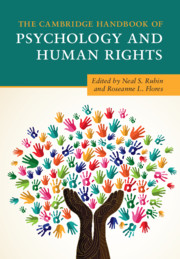Book contents
- The Cambridge Handbook of Psychology and Human Rights
- The Cambridge Handbook of Psychology and Human Rights
- Copyright page
- Dedication
- Contents
- Figures
- Tables
- Boxes
- Contributors
- Acknowledgments
- The Core International Human Rights Instruments and Their Monitoring Bodies
- Universal Human Rights Instruments
- Sustainable Development Goals
- Glossary of United Nations and Psychology Acronyms in the Handbook
- Introduction
- Part I History of Human Rights
- Part II The Intersection of Psychology and Human Rights
- Part III Contemporary Issues in Psychology and Human Rights
- Part IV Teaching, Research, and Training in Psychology and Human Rights
- Part V Future Directions
- 36 Human Rights and Reconciliation
- 37 The Australian Psychological Society’s Apology to Aboriginal and Torres Strait Islander People
- 38 The Role of Scientific Societies in Promoting and Protecting Human Rights and the Example of the American Psychological Association
- 39 Human Rights, Psychology, and Artificial Intelligence
- 40 Psychology, Human Rights, and the Implementation of the United Nations’ 2030 Agenda for Sustainable Development
- Index
- References
37 - The Australian Psychological Society’s Apology to Aboriginal and Torres Strait Islander People
Going beyond the Apology in the Teaching and Training of Psychologists
from Part V - Future Directions
Published online by Cambridge University Press: 02 October 2020
- The Cambridge Handbook of Psychology and Human Rights
- The Cambridge Handbook of Psychology and Human Rights
- Copyright page
- Dedication
- Contents
- Figures
- Tables
- Boxes
- Contributors
- Acknowledgments
- The Core International Human Rights Instruments and Their Monitoring Bodies
- Universal Human Rights Instruments
- Sustainable Development Goals
- Glossary of United Nations and Psychology Acronyms in the Handbook
- Introduction
- Part I History of Human Rights
- Part II The Intersection of Psychology and Human Rights
- Part III Contemporary Issues in Psychology and Human Rights
- Part IV Teaching, Research, and Training in Psychology and Human Rights
- Part V Future Directions
- 36 Human Rights and Reconciliation
- 37 The Australian Psychological Society’s Apology to Aboriginal and Torres Strait Islander People
- 38 The Role of Scientific Societies in Promoting and Protecting Human Rights and the Example of the American Psychological Association
- 39 Human Rights, Psychology, and Artificial Intelligence
- 40 Psychology, Human Rights, and the Implementation of the United Nations’ 2030 Agenda for Sustainable Development
- Index
- References
Summary
In Australia, the gap between Indigenous and non-Indigenous mental health and well-being is a major human rights issue, and escalating suicide rates represent a national emergency. This chapter describes the Australian human rights context and developments within the discipline and profession of psychology to address these inequities, with the reconciliation action plan developed by the Australian Psychological Society (APS) as one commitment to change. The focus on respectful relationships, cultural safety, and promoting self-determination is part of the background leading to the APS apology to Aboriginal and Torres Strait Islander people. The apology highlighted the importance of a commitment by all psychologists to reconciliation and to modifying their attitudes and work practices to ensure a culturally appropriate, responsive, and safe workforce. The Australian Indigenous Psychology Education Project (AIPEP) represents a focus on the education and employment of the psychology workforce and illustrates collaboration with key stakeholders in psychology education to provide frameworks and guidelines for embedding cultural awareness, responsiveness, and competence throughout all psychology education.
Keywords
- Type
- Chapter
- Information
- The Cambridge Handbook of Psychology and Human Rights , pp. 553 - 567Publisher: Cambridge University PressPrint publication year: 2020
References
- 3
- Cited by

